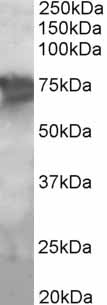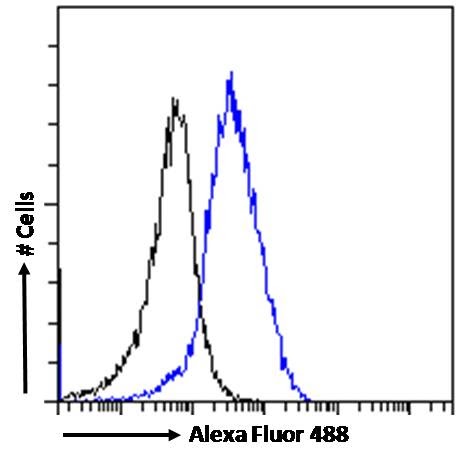Goat Anti-PCK2 / PEPCK-M Antibody
Peptide-affinity purified goat antibody
- SPECIFICATION
- CITATIONS
- PROTOCOLS
- BACKGROUND

Application
| WB, IF, FC, Pep-ELISA |
|---|---|
| Primary Accession | Q16822 |
| Other Accession | NP_004554, 5106 |
| Reactivity | Human, Mouse, Rat, Guinea Pig |
| Predicted | Pig, Dog |
| Host | Goat |
| Clonality | Polyclonal |
| Concentration | 100ug/200ul |
| Isotype | IgG |
| Calculated MW | 70699 Da |
| Gene ID | 5106 |
|---|---|
| Other Names | Phosphoenolpyruvate carboxykinase [GTP], mitochondrial, PEPCK-M, 4.1.1.32, PCK2, PEPCK2 |
| Format | 0.5 mg IgG/ml in Tris saline (20mM Tris pH7.3, 150mM NaCl), 0.02% sodium azide, with 0.5% bovine serum albumin |
| Storage | Maintain refrigerated at 2-8°C for up to 6 months. For long term storage store at -20°C in small aliquots to prevent freeze-thaw cycles. |
| Precautions | Goat Anti-PCK2 / PEPCK-M Antibody is for research use only and not for use in diagnostic or therapeutic procedures. |
| Name | PCK2 (HGNC:8725) |
|---|---|
| Synonyms | PEPCK2 |
| Function | Mitochondrial phosphoenolpyruvate carboxykinase that catalyzes the conversion of oxaloacetate (OAA) to phosphoenolpyruvate (PEP), the rate-limiting step in the metabolic pathway that produces glucose from lactate and other precursors derived from the citric acid cycle (PubMed:28955899). Can play an active role in glyceroneogenesis and gluconeogenesis (PubMed:28955899). |
| Cellular Location | Mitochondrion. |
| Tissue Location | Widely expressed.. |

Thousands of laboratories across the world have published research that depended on the performance of antibodies from Abcepta to advance their research. Check out links to articles that cite our products in major peer-reviewed journals, organized by research category.
info@abcepta.com, and receive a free "I Love Antibodies" mug.
Provided below are standard protocols that you may find useful for product applications.
Background
This gene encodes a member of the phosphoenolpyruvate carboxykinase (GTP) family. The protein is a mitochondrial enzyme that catalyzes the conversion of oxaloacetate to phosphoenolpyruvate in the presence of GTP. A cytosolic form encoded by a different gene has also been characterized and is the key enzyme of gluconeogenesis in the liver. The encoded protein may serve a similar function, although it is constitutively expressed and not modulated by hormones such as glucagon and insulin that regulate the cytosolic form. Alternatively spliced transcript variants have been described.
References
COMMON VARIANTS IN 40 GENES ASSESSED FOR DIABETES INCIDENCE AND RESPONSE TO METFORMIN AND LIFESTYLE INTERVENTIONS IN THE DIABETES PREVENTION PROGRAM. Jablonski KA, et al. Diabetes, 2010 Aug 3. PMID 20682687.
Fasting hyperglycemia is not associated with increased expression of PEPCK or G6Pc in patients with Type 2 Diabetes. Samuel VT, et al. Proc Natl Acad Sci U S A, 2009 Jul 21. PMID 19587243.
Endurance capacity, not body size, determines physical activity levels: role of skeletal muscle PEPCK. Novak CM, et al. PLoS One, 2009 Jun 12. PMID 19521512.
Multiple genetic variants along candidate pathways influence plasma high-density lipoprotein cholesterol concentrations. Lu Y, et al. J Lipid Res, 2008 Dec. PMID 18660489.
AMP-activated protein kinase regulates PEPCK gene expression by direct phosphorylation of a novel zinc finger transcription factor. Inoue E, et al. Biochem Biophys Res Commun, 2006 Dec 29. PMID 17097062.
If you have used an Abcepta product and would like to share how it has performed, please click on the "Submit Review" button and provide the requested information. Our staff will examine and post your review and contact you if needed.
If you have any additional inquiries please email technical services at tech@abcepta.com.













 Foundational characteristics of cancer include proliferation, angiogenesis, migration, evasion of apoptosis, and cellular immortality. Find key markers for these cellular processes and antibodies to detect them.
Foundational characteristics of cancer include proliferation, angiogenesis, migration, evasion of apoptosis, and cellular immortality. Find key markers for these cellular processes and antibodies to detect them. The SUMOplot™ Analysis Program predicts and scores sumoylation sites in your protein. SUMOylation is a post-translational modification involved in various cellular processes, such as nuclear-cytosolic transport, transcriptional regulation, apoptosis, protein stability, response to stress, and progression through the cell cycle.
The SUMOplot™ Analysis Program predicts and scores sumoylation sites in your protein. SUMOylation is a post-translational modification involved in various cellular processes, such as nuclear-cytosolic transport, transcriptional regulation, apoptosis, protein stability, response to stress, and progression through the cell cycle. The Autophagy Receptor Motif Plotter predicts and scores autophagy receptor binding sites in your protein. Identifying proteins connected to this pathway is critical to understanding the role of autophagy in physiological as well as pathological processes such as development, differentiation, neurodegenerative diseases, stress, infection, and cancer.
The Autophagy Receptor Motif Plotter predicts and scores autophagy receptor binding sites in your protein. Identifying proteins connected to this pathway is critical to understanding the role of autophagy in physiological as well as pathological processes such as development, differentiation, neurodegenerative diseases, stress, infection, and cancer.






